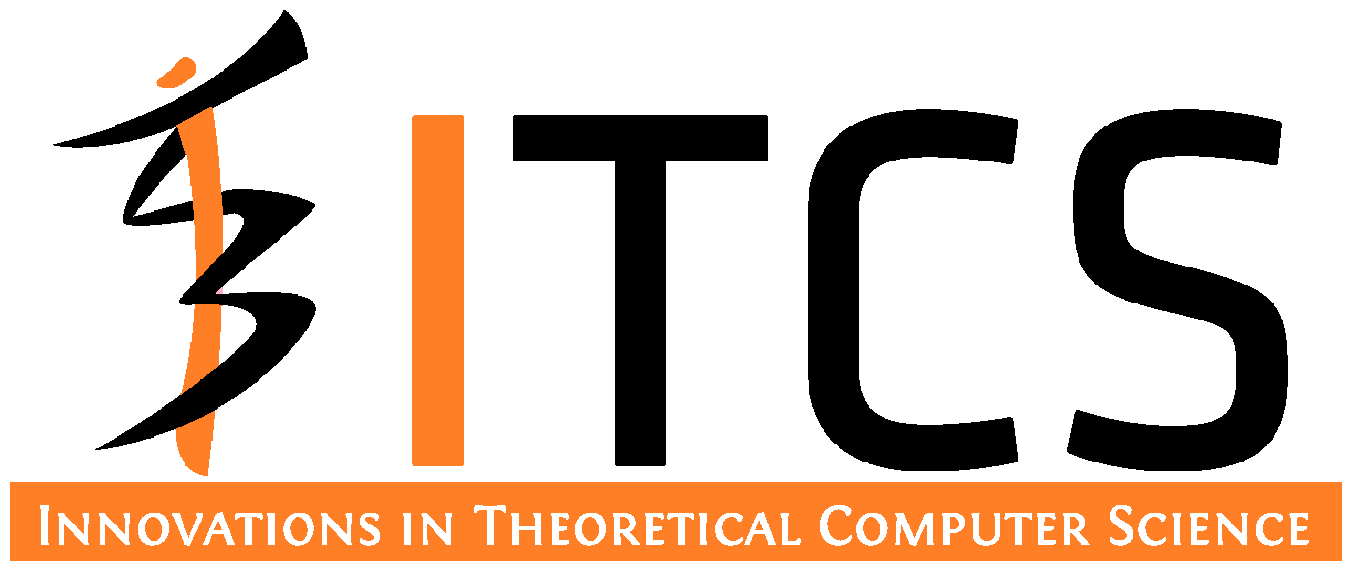
ITCS 2021 Program and Schedule
Welcome to ITCS 2021. The conference is virtual, being hosted on the Simons Institute gather.town map, where you can meet and chat with other attendees and access both Lecture Rooms (Room A and Room B). The sessions will take place as Zoom webinars and can also be accessed via the links in the schedule below.
Registration: In order to have the option to be seen/heard during the sessions, you must register here. Note that registration is free, and it is intended that all participants should register.
Additional Information (session format, Graduating Bits, code of conduct)
Session and talk format: Each session is one hour long, composed of five (with a few exceptions) 8-minute live presentations. Following the presentations, there is a 20-minute "panel discussion" period whose format is decided by the session chair. This is an opportunity for the audience to ask questions, or for the chair to facilitate a discussion among the speakers. The sessions generally alternate between Room A and Room B so that if panel discussions run long, they don't cut into the next session.
Graduating bits: As is tradition at ITCS, there will be a "Graduating Bits (GB)" session intended for conference participants who are near to graduation (on either side) and wish to present their results, research, plans, personality, etc. This will take place at 09:30AM on January 7th (in the second session of the day). If you wish to participate, contact the GB organizer Gautam Kamath (g@csail.mit.edu) as soon as possible. In your email, please include basic information (year or intended year of graduation, university, PhD advisor, thesis topic).
Code of conduct: ITCS is committed to an inclusive conference experience, respectful of all participants, and free from any discrimination or harassment, including unwelcome advances or propositions of an intimate nature, particularly when coming from a more senior researcher to a less senior one. All ITCS attendees are expected to behave accordingly. If you experience or witness discrimination, harassment or other unethical behavior at the conference, we encourage you to seek advice and remedy.
In the schedule below, you can find recorded videos of longer presentations. You can join the ITCS 2021 slack by clicking here. There is a slack channel associated to every paper where one can ask questions or enter discussions with the authors and other conference attendees. All times are in PST (California time zone).
January 6th |
|||||||
| 08:15-08:30
Room A |
Introductory remarks | ||||||
| 08:30-09:30
Crypto and Privacy Room A Chair: Elette Boyle |
|
||||||
| 09:30-10:30
Distributed models Room B Chair: Leonard Schulman |
|
||||||
| 10:30-11:30
Matchings Room A Chair: Matt Weinberg |
|
||||||
| 11:30-12:30
Analytic methods Room B Chair: Avishay Tal |
|
||||||
| 12:30-13:30 | BREAK | ||||||
| 13:30-14:30
Pseudorandomness Room A Chair: Luca Trevisan |
|
||||||
| 14:30-15:30
Computational complexity Room B Chair: Aviad Rubenstein |
|
||||||
| 15:30-16:30
Room A |
BUSINESS MEETING | ||||||
January 7th |
|||||||
| 08:00-08:30 | gather.town | ||||||
| 08:30-09:30
Quantum Room B Chair: Andris Ambainis |
|
||||||
| 09:30-10:30
Room A |
GRADUATING BITS | ||||||
| 10:30-11:30
Algorithmic game theory Room B Chair: Kira Goldner |
|
||||||
| 11:30-12:30
Algorithms Room A Chair: Sam Hopkins |
|
||||||
| 12:30-13:30 | Virtual coffee break in gather.town | ||||||
| 13:30-14:30
Graph algorithms Room A Chair: Anindya De |
|
||||||
| 14:30-15:30
Quantum information Room B Chair: Anand Natarajan |
|
||||||
| 15:30-16:30
Circuits and communication Room A Chair: Avishay Tal |
|
||||||
January 8th |
|||||||
| 08:00-08:30 | gather.town | ||||||
| 08:30-09:30
Machine Learning Room A Chair: Sebastien Bubeck |
|
||||||
| 09:30-10:30
Codes and information Room B Chair: Andris Ambainis |
|
||||||
| 10:30-11:30
Algorithimc Game Theory Room A Chair: Aviad Rubenstein |
|
||||||
| 11:30-12:30
Online and streaming algorithms Room B Chair: Sam Hopkins |
|
||||||
| 12:30-13:30 | Virtual coffee break in gather.town | ||||||
| 13:30-14:30
Optimization Room A Chair: Sebastien Bubeck |
|
||||||
| 14:30-15:30
Algebraic and circuit complexity Room B Chair: Anindya De |
|
||||||